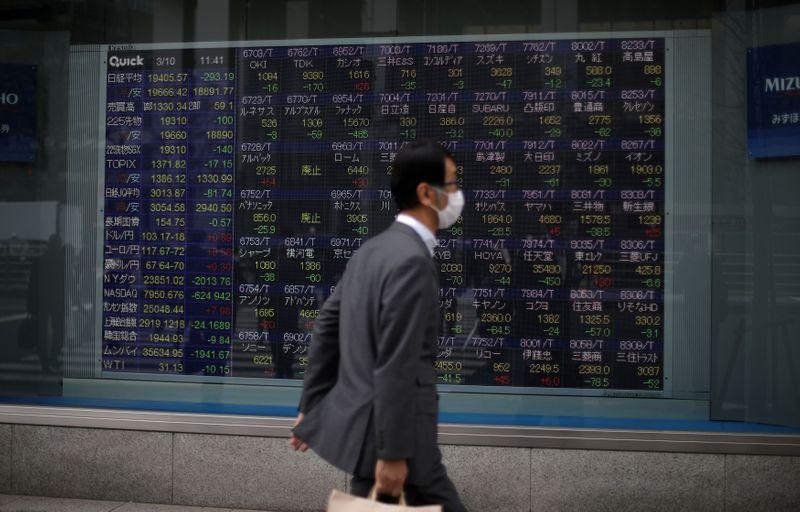By Jessica DiNapoli
NEW YORK (Reuters) - Asian markets were set to follow a tumble in Wall Street stocks and oil prices on Thursday after surging U.S. coronavirus cases and the International Monetary Fund’s downgrade to global economic projections shook confidence in a recovery.
“At the moment futures are looking at some pretty steep losses,” said James Tao, a market analyst at Australian broker CommSec. “It’s no real surprise considering the heavy declines on Wall Street.”
Tao said spiking coronavirus cases and new restrictions aimed at tamping down the spread of the pandemic were the straw that broke the camel’s back, after markets gained earlier in the week.
Australian S&P/ASX 200 futures lost 1.55% in early trading. Japan’s Nikkei 225 futures fell 1.1%.
Markets in Hong Kong and mainland China are closed for public holidays on Thursday.
On Wednesday, three U.S. states reported record increases in new cases – Florida, Oklahoma and South Carolina – driving the negative sentiment. Seven others had record highs earlier in the week.
The governors of New York, New Jersey and Connecticut, initially hard hit by the pandemic, ordered travelers from nine other states to quarantine for 14 days on arrival as COVID-19 showed signs of rising in other areas.
Impact Shorts
More ShortsThe International Monetary Fund said it now expects a deeper recession, with global output to shrink 4.9% this year, much sharper than the 3.0% contraction predicted in April.
MSCI’s gauge of stocks across the globe <.MIWD00000PUS> shed 2.24%.
On Wall Street, the Dow Jones Industrial Average <.DJI> fell 2.72%, the S&P 500 <.SPX> lost 2.59% and the Nasdaq Composite <.IXIC> dropped 2.19%.
“The pace of the acceleration (of new cases) is causing businesses and consumers to act, with Open Table showing restaurant bookings have dived in the southern U.S.,” the National Australia Bank said in a research note.
“Governors in the southern states who have been reluctant to reimpose restrictions have also sharply changed their rhetoric. These trends threaten the pace of the tentative recovery seen in the data to date.”
Oil prices tumbled as much as 5%, or more than $2 a barrel on Wednesday, due to the growing COVID-19 cases and rising oil inventories.
The dollar strengthened on the concerns of a slower economic recovery. The dollar index <=USD> rose 0.624%. [FRX/]
(Reporting by Jessica DiNapoli; Editing by Sam Holmes)
This story has not been edited by Firstpost staff and is generated by auto-feed.


)

)
)
)
)
)
)
)
)



